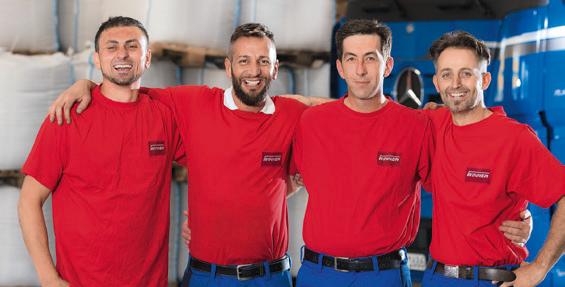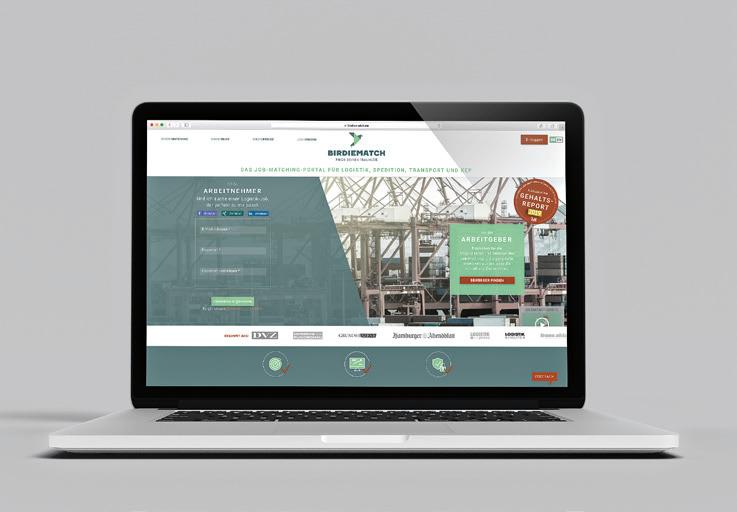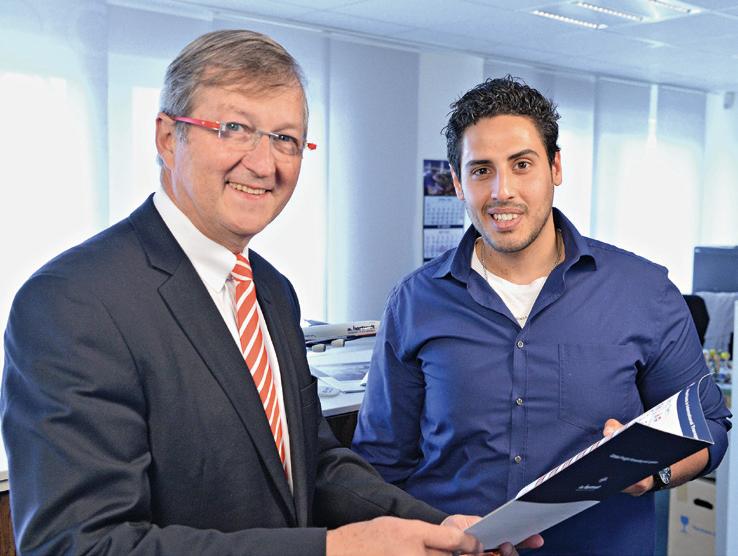
N
ew technologies are opening up new opportunities for companies: they can develop through them and offer different things to their customers. In transport and logistics, it is the acquisition and processing of data, above all, that can optimise processes and develop completely new business models. At the same time, the industry is facing numerous challenges: cost and time pressure is increasing, volumes are too, and protecting the climate is becoming one of the most urgent global issues. Innovative products can help here, too: they make companies more efficient and therefore keep them competitive by providing more sustainable and resource-efficient transport, for example.
RETAINING PERSONNEL OVER THE LONG TERM
These processes are always shaped by the people who work in the companies concerned. Sustainability is also the key criterion for a positive future in HR: as a company, you can remain successful over the long term only with well-trained, motivated staff. Attracting people like this is not easy in times of skilled personnel shortages. But how can it be done?

“Anyone can learn anything, if they have the drive to achieve their goals.”
Anna Athens,
Head of Human Resources
Head of Human Resources
Spedition Winner in Iserlohn is an international logistics company with 21 branches and roughly 500 employees in Germany, Italy, Poland, the Czech Republic and Austria. “Like most companies in this industry, the shortage of drivers is also having an effect on us,” said Anna Athens, Head of Human Resources. In the past, when trainees were learning to drive, there were always problems: “In some cases, the trainees were away from the company for a whole day for their lessons, but then told us that they had a chance to drive themselves only for an hour.” The conviction that “It can’t be that difficult!” gave rise to the idea: “Can we not train them ourselves?”
TRANSPORT COMPANY SETS UP ITS OWN DRIVING SCHOOL
This is how the idea was born to train the apprentices inhouse, both theoretically and practically. Additionally, Winner is also cooperating with a local driving school. “We converted one of our own, modern lorries which can now be used by our trainees for their driving lessons,” reported Anna Athens. “The continual use of one and the same truck was very well received – which is not the case in conventional driving schools.”

The first trainee has already passed his driving exam, and the next group are in training. Training in the company has many other advantages: the instructor can provide more individual support, for example, and address the strengths and weaknesses of each person specifically. The lessons can be integrated into the training day effectively in terms of time, and the trainees save time travelling to and from the driving school. “The concept has been very well received,” Athens was delighted to report. Eleven trainees started out on the first year of their training with Spedition Winner in 2019. “Anyone can learn anything if they have the drive to achieve their goals,” said the authorised representative with conviction.
DIGITAL PLATFORM FOR DRIVERS
Digital tools can also help to find skilled workers. The start-up Birdiematch has set up a platform that links applicants and employers in seconds. On Birdiematch.de, candidates can create a profile free of charge that provides information about their driving licence, professional experience, skills and expected salary, for example. For their part, employers can describe precisely which vacancies they have, what they expect of a new employee, and what they can offer. Both sides therefore quickly know whether they are a match. “Of course, Birdiematch can’t just make new drivers appear out of thin air,” says Josef Schindler, Managing Director of the company. “But we can make it easier for employers and employees to connect.” For him, one of the biggest challenges in fighting the shortage of drivers lies in being able to provide better working conditions for drivers and generally making the profession more attractive.

“We can make it a lot easier for employers and employees to connect.”
Josef Schindler,
Managing Director of Birdiematch
Managing Director of Birdiematch
Birdiematch has been online since May 2019 with warehouse and driving jobs, and around 1,000 drivers have registered in that time. “The service has gone down well on both sides. Of course, you can’t deny that experienced drivers must be regarded as a ‘scarce commodity’,” says Schindler. “The gap between the drivers who are reaching retirement age and the next generation is just too big. Added to that is the fact that drivers often complain about the low status attached to their profession and their working conditions. We would like to take this opportunity to appeal to companies to take their drivers’ opinions seriously and consider far-reaching changes.” It is also time for HR to “move into the digital age at last,” says Schindler. “Of course that means making the necessary effort to bring about change, and it will cost money at first, but a lot less than the so-called lay-off costs of vehicles standing idle for lack of drivers!” With Birdiematch, the costs per appointment should be reduced for customers by as much as two thirds: “Investment in digital recruitment and active searches for employees pays off several times over in the end.”

INTERNATIONAL TEAMS
Transport is an international business – so what could be more obvious than to recruit international employees? At the Hamburg-based transport company Spedition A. Hartrodt, for example, many of the employees are from a migration background; they come from Ghana, Afghanistan, Pakistan and Egypt, among other places. “We have contacts in 60 countries in the world, talk to other cultures every day and we are very open,” explains Willem van der Schalk, Managing Director of the company. “We therefore see the employment of refugees in our company as a big opportunity.” Private acquaintances who work in a refugee initiative told him some years ago that there are many young people among the migrants who come from Syria, for example, who have studied there and speak several languages – English and French, in addition to their native Arabic. “Precisely these kinds of skills are rare on the job market. I think it’s a shame that this potential is not being used,” says van der Schalk. “The official requirements seemed insurmountable at first, until we started offering training places.”

“We see the employment of refugees in our company as a big opportunity.”
Willem van der Schalk,
Managing Director of Spedition A. Hartrodt
Managing Director of Spedition A. Hartrodt
Three young men of Syrian origin seized the opportunity. One of them changed direction and switched to an apprenticeship in a different industry, but two successfully completed their qualification as commercial assistants. The communities in which the men were initially living supported them in learning German. “The language was actually the biggest hurdle. It helped a lot that our other trainees in the company took responsibility and helped their colleagues to learn for the exams. I think that was actually the secret to our success.”
INSPIRATIONAL COMMITMENT
The transport company went public with its experiences to inspire others. In 2017 Willem van der Schalk has been awarded the “LEO Award” of the Deutsche Verkehrs-Zeitung in the “People” category for his commitment to the integration of refugees in the industry. He advises other companies that also want to appoint migrants as employees to research the topic thoroughly and to supplement the support offered by the employment agencies, for example: “You have to be prepared to overlook gaps in their training; someone who cannot speak German, for example, can learn to do so. We helped to finance appropriate courses,” says van der Schalk. He also recommends giving the young people several mentors to support them: “They should not just see this as a paper exercise, but really provide long-term support.”

Photos: iStock/Prostock-Studio, Winner, Birdiematch, Freepik, a. hartrodt




